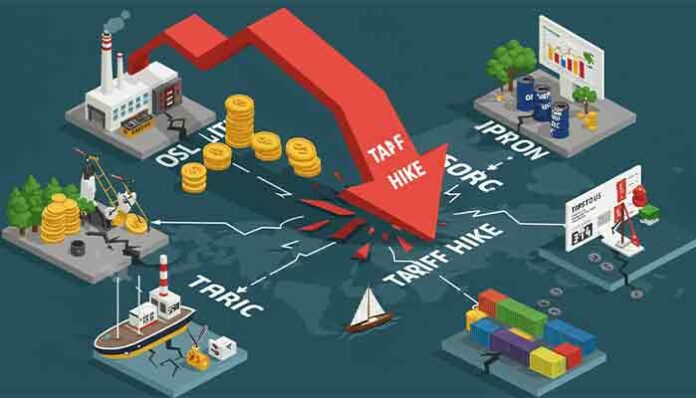Trade Tensions Heat Up as U.S. Implements Major Tariff Hike
Today (Wednesday), the U.S. took a hard swing in the ongoing trade battle as President Trump’s newest tariffs came into effect. Chinese products bore the brunt, slapped with over 100% in added duties — a dramatic step that’s already sending ripples through global markets and turning up the pressure on trade partners around the world. Trump’s 104% Tariff Hike is making waves globally and reshaping trade negotiations.
The Tariff Impact on China
China’s in a tough spot right now. As both a major trading partner and America’s biggest economic challenger, it’s bearing the brunt of Trump’s aggressive tariff strategy. Since his return to office, import taxes on Chinese goods have shot up sharply — now reaching a jaw-dropping 104%, shaking up the trade landscape in a big way. Trump’s 104% Tariff Hike has turned what was once a slow-burning trade dispute into a full-fledged economic confrontation.
Global Repercussions of the Tariff Hike
After the 10% tariffs were put in place, the global economy began to feel the pressure. By 12:01 a.m. (0401 GMT) Wednesday, import prices from regions like the European Union and Japan to the U.S. soared even higher.
On Tuesday, Trump mentioned that his team is negotiating “personalized agreements” with trade partners, with the White House prioritizing key allies like Japan and South Korea.
Trump’s lead trade advisor, Jamieson Greer, shared with the Senate that nations such as Argentina, Vietnam, and Israel are open to reducing their tariffs.
During a dinner with Republican colleagues on Tuesday night, Trump remarked that countries are eager and “anxious” to strike a deal.
Still, Beijing has firmly stated it won’t back down, promising to push through the trade war and take decisive steps to defend its interests.
Starting this Thursday, China’s 34% tariffs on U.S. goods will go into effect, delivering a significant blow in the ongoing trade battle.
Economic Ramifications: Higher Prices and Inflation
According to the U.S. president, his approach will revive America’s manufacturing industry by encouraging businesses to shift their operations back to the country.
Experts are doubtful about how quickly this shift can happen, warning that the tariffs may cause higher prices and inflation.
On Tuesday, Trump highlighted that the U.S. is raking in nearly $2 billion a day from tariffs.
Initially, he imposed a 34% additional fee on products imported from China.
When China retaliated with its own tariff on U.S. goods, Trump escalated the situation by adding a 50% duty.
With the tariffs from February and March factored in, the total increase on Chinese goods during Trump’s second term soars to an impressive Trump’s 104% Tariff Hike is now being analyzed for its long-term impact on global inflation trends and market confidence.
According to Trump, China now holds the reins, as he believes they’re keen for a deal but unsure how to begin the process.
On Tuesday night, Trump indicated that the U.S. was set to impose a substantial tariff on pharmaceutical products in the near future.
In another development, Canada announced that starting Wednesday, tariffs will be applied to specific U.S. car imports.
China Expresses Confidence in Its Position
Following a recent wipeout of trillions in value on global stock markets, Asian markets took another significant hit on Wednesday. Hong Kong plunged more than three percent, while Japan’s Nikkei tumbled by 2.7 percent.
Earlier this week, the South Korean won plummeted to its lowest value against the dollar since 2009, causing ripples in the foreign exchange markets.
On Wednesday, China’s offshore yuan sank to a new low against the US dollar, as the country’s central bank continued its efforts to weaken the currency. This move marked the fifth consecutive day of devaluation, according to Bloomberg.
For the first time since April 2021, West Texas Intermediate oil prices plunged below $60, marking a dramatic change not witnessed in over two years.
To prevent further escalation, Ursula von der Leyen, the EU’s leader, spoke with Chinese Premier Li Qiang, urging restraint. She emphasized that worsening the trade tensions could lead to serious, unpredictable outcomes.
According to the EU, she highlighted the importance of maintaining global economic stability and preventing further escalation.
Europe Prepares for Retaliation
During their conversation, the Chinese Premier assured von der Leyen that China is optimistic about its economic prospects and firmly believes it can overcome current challenges while maintaining consistent growth.
The European Union, often criticized by Trump for its tariffs, is expected to announce its response next week to the new 20% tariffs it faces.
Following the US’s steel and aluminum tariffs last month, the European Union is preparing to retaliate with tariffs of up to 25% on a range of American products, including soybeans and motorcycles, according to a document obtained by AFP.
Custom-Made Agreements
On Tuesday, Wall Street ended lower, with the S&P 500 falling 1.6 percent.
In a rare public clash over tariffs, Trump ally Elon Musk called White House trade advisor Peter Navarro “dumber than a sack of bricks.
Elon Musk, critical of Trump’s trade policies, swiftly responded after Peter Navarro called Tesla “a car assembler” seeking cheap foreign parts, clearly irritated by the comment.

